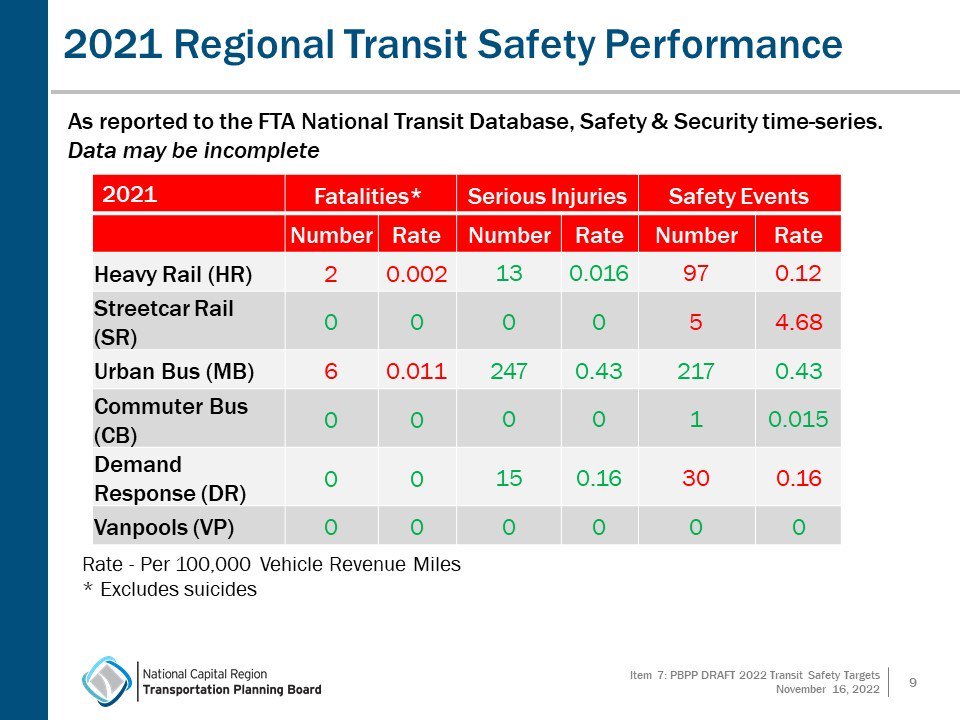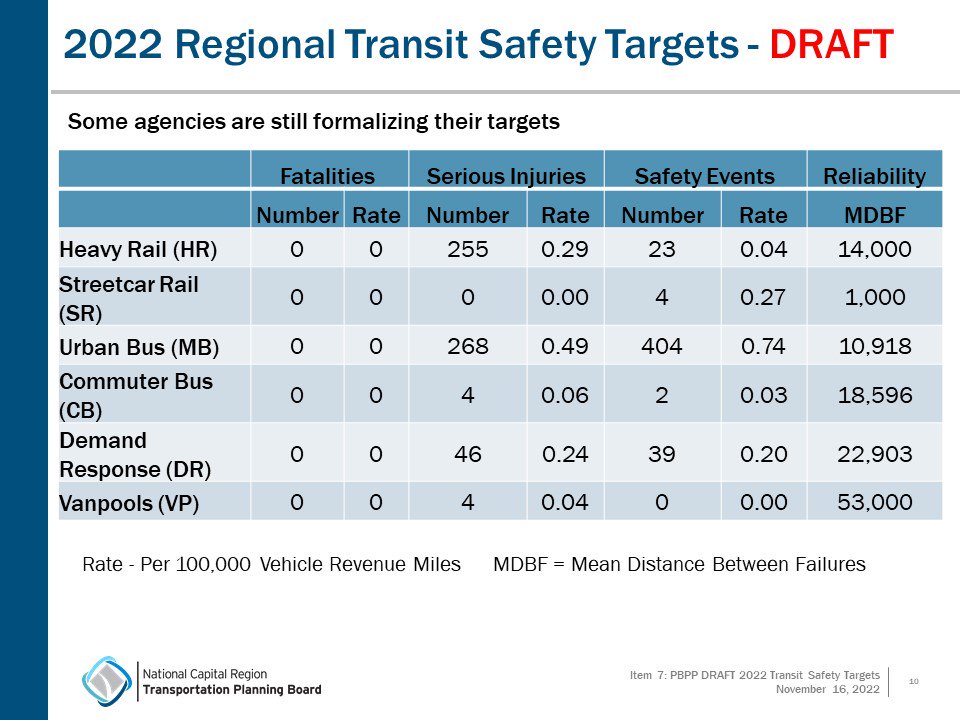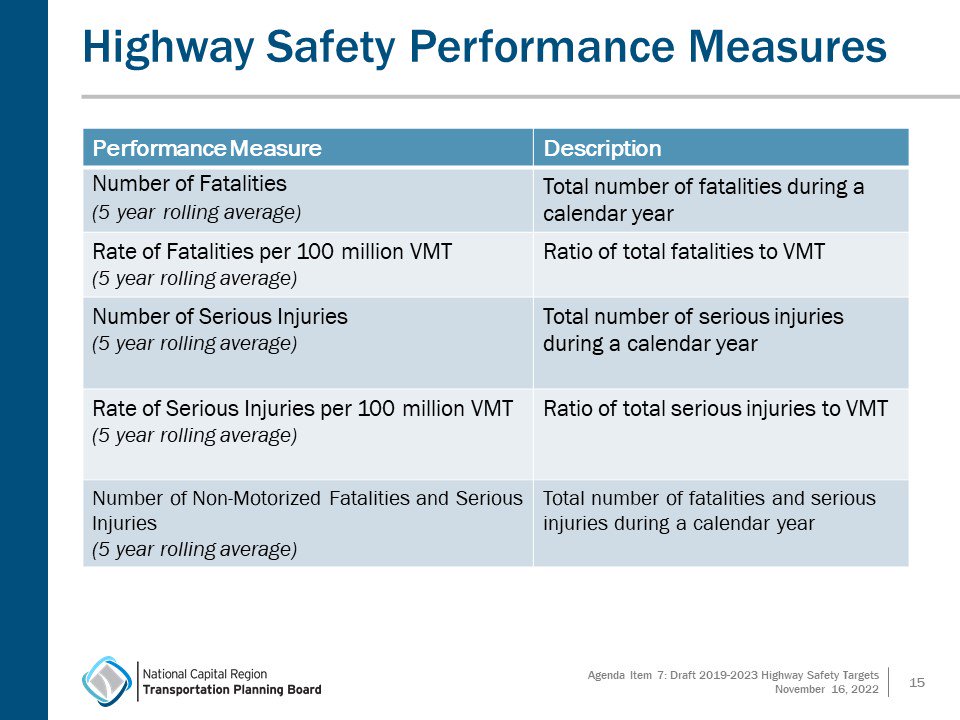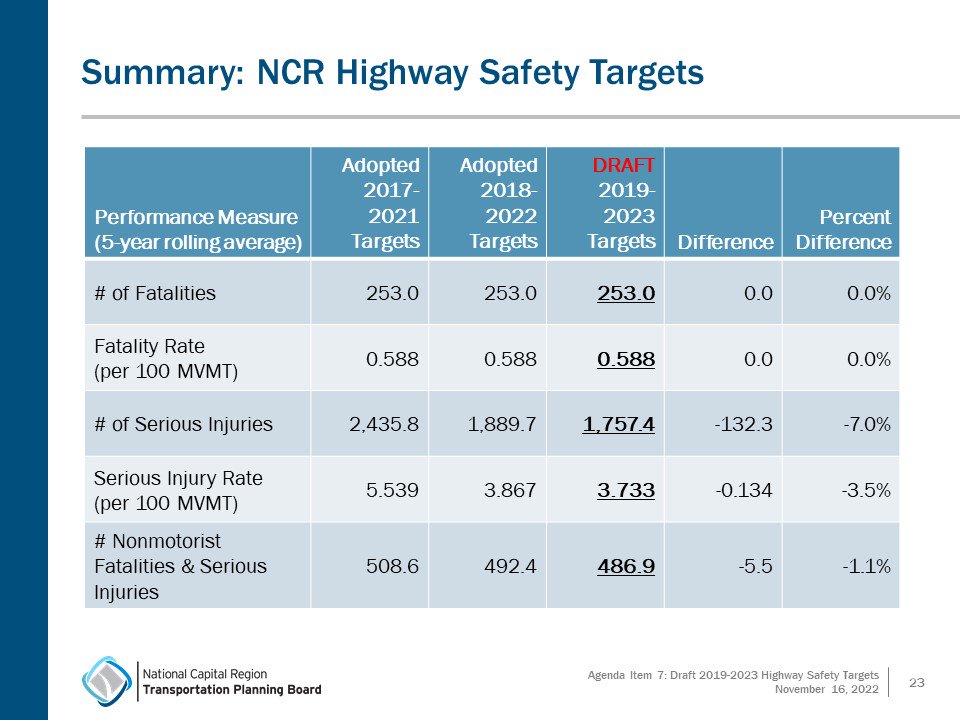At its November meeting, the TPB reviewed draft 2022 regional transit safety targets and draft 2019-2023 highway safety targets as part of federally required Performance Based Planning and Programming. In addition, TPB staff presented an overview of documents related to preparation for the 2024 long-range transportation plan update: the draft synthesized policy framework and the draft summary of scenario findings. The policy framework, which outlines the TPB’s principles, goals, strategies, and performance outcomes, will be distributed to TPB member jurisdictions in conjunction with the technical input solicitation for the upcoming long-range transportation plan and Transportation Improvement Program (TIP) updates. The scenario findings summary assists TPB members with choosing projects, programs, and policies to add to the long-range transportation plan that have been shown to have the greatest potential to advance TPB’s goals.
Meeting agenda, materials, and recording.
TPB MEMBER TRANSITIONS
TPB Chair Pamela Sebesky recognized Kacy Kostiuk, Takoma Party City Council Member, for service as a TPB member from 2018-2022, and as Access for All Advisory Committee chair from 2018-2021.
Chair Sebesky announced that the December 2022 meeting will mark the end of her tenure as TPB chair and the end of first and second vice chair terms of Reuben Collins, Charles County Board of Commissioners, and Christina Henderson, District of Columbia Council Member. Sebesky has convened a nominating committee that includes Charles Allen, District of Columbia Councilmember, Kelly Russell, City of Frederick Alderman, and Jeanette Rishell, City of Manassas Park Mayor, to identify a slate of candidates of the TPB chair and vice chairs for 2023.
INFORMATIONAL ITEMS
Safety Work Session
A Safety Roundtable with the District Department of Transportation, Maryland DOT, and Virginia DOT was held prior to the TPB meeting. The session featured an update on DDOT’s Vision Zero program, Maryland DOT’s Strategic Highway Safety Plan, and Virginia DOT presented on Strategic Highway Safety and proven countermeasures to roadway departures, intersection crashes, and locally maintained initiatives.
For more details, check out the TPB News highlight on the Safety Roundtable.
Draft Highway and Transit Safety Targets
Ahead of the December TPB meeting, members reviewed two sets of draft safety targets. Board members will be asked to approve the final targets at their December meeting.
Transit Safety Targets
Recipients of Federal Transit Administration (FTA) Section 5307 funding (the grant program that provides funding to urbanized areas over 50,000 in population) that fall under the FTA’s safety jurisdiction are required to set annual safety targets. The same rule that requires targets for transit systems also requires metropolitan planning organizations (MPOs) to set overarching transit safety targets for their planning areas. The TPB, as an MPO, sets targets for fatalities, injuries, safety events (i.e., collisions, derailments, fires, or safety evacuations), and system reliability.
Transit agencies in the region included in the target setting are:
WMATA: Metrorail, Metrobus, MetroAccess
DDOT: DC Circulator, DC Streetcar
MDOT-MTA: MTA Commuter Bus
PRTC: Bus and paratransit
VanGo (Charles County, MD)
TransIT (Frederick County, MD)
Ride On (Montgomery County, MD)
The Bus (Prince George’s County, MD)
The following tables list 2021 transit safety performance and 2022 transit safety targets. For 2022, fatality targets are set at zero.


Highway Safety Targets
In addition to the transit safety targets, the TPB is responsible for highway safety performance evaluation and target setting under the Federal Highway Administration’s Highway Safety Improvement Program. Again, as an MPO, TPB adopts targets annually for specific safety performance measures. The performance measures related to fatalities, serious injuries, and non-motorized fatalities and serious injuries are listed in the following table and are reported as five-year rolling averages.

Between 2020 and 2021 (coronavirus pandemic height), both fatalities and serious injuries from roadway crashes increased, reversing a downward trend in serious injuries since 2006. As a result, between 2017 and 2021, the TPB met only two of its highway safety performance targets: number of serious injuries and serious injury rate per 100 million vehicle miles of travel. The updated 2019 – 2023 updated draft targets are posted in the table below. Fatality and fatality rate goals remain the same. The targets for the other three categories are lower than prior years, with emphasis on decreasing serious injuries. As with the transit safety targets, the TPB will be asked to adopt final highway safety targets at its December meeting.

Visualize 2050: 2024 Long-Range Transportation Plan Update
The TPB intends to update its long-range transportation plan by the end of 2024 with a technical input solicitation for projects in early 2023, which allows three to four months for elected officials to have conversations within their jurisdictions to make sure that projects that their agencies propose are reflective of the TPB policy framework and scenario findings.
TPB staff will schedule virtual meetings with board members in the District, Maryland, and Virginia to have subregional conversations about projects, programs, and policies being resubmitted for the plan update.
The various reference documents TPB members will have to inform their submissions to the plan update includes two new documents: TPB policy framework document that synthesizes TPB policy priorities into a short document that reflects the ideas of Region Forward, the goals and challenges documented in the Regional Priorities Plan, and the Aspirational Initiatives; the scenario findings summary document which includes a short series of what-if questions and analysis to help TPB members determine good choices when it comes to strategy investment, who benefits from the investments, and what can be expected from investments such as implementing a bus rapid transit system or expanding Metro.
The TPB Policy Framework and Scenario Findings will be available on the Visualize 2045 website and will also be distributed to TPB member jurisdictions in early 2023 as they prioritize and submit projects for inclusion in the plan.
WMATA Better Bus Listening Session
The WMATA Better Bus Listening Session held at the November TPB meeting is one of several being conducted with TPB committee and board members. Allison Davis, WMATA Manager of Regional Planning, reported that across demographic groups in the region, customers are seeking frequency, reliability, and connectivity in a bus network. Davis shared several strategies that advance goals outlined in Visualize 2045, including improving customer information, partnering with local jurisdictions on bus priority, and the transition to zero-emission buses.
WMATA is examining need and using a foundation of guiding principles for its bus network redesign. According to WMATA, transit providers in Prince George’s County and the City of Fairfax are also participating in the Better Bus study. He added that WMATA is coordinating with Montgomery County on their on-going bus network redesign, Ride On Reimagined.
TPB Vice Chair Reuben Collins II, President of the Charles County Board of County Commissioners, commented that the 2018 elimination of Metrobus Route W19 has affected the mobility of traditionally underserved populations and federal workers who travel to the naval support facility in southern Maryland. Collins asked WMATA to consider the impact of ceasing operations to their riders, and he noted that Charles County will follow up with comments on this route and the requested feedback by letter.
Earl Lewis, Maryland Department of Transportation Deputy Secretary Policy, Planning & Enterprise Services, commended WMATA’s effort to consider populations who are dependent on transit and their focus on connectivity to job centers. He said that this connectivity is important to low-income populations who cannot afford a vehicle and those who make the choice to take transit.
Canek Aguirre, Alexandria City Council Member, noted that localities may hold the responsibility of safety and bus stop infrastructure. Aguirre asked WMATA to highlight their needs from localities to help prioritize those projects at the local level, and he noted the importance of pedestrian connectivity to transit routes.
Committee and Director’s Reports
TPB Technical Committee Meeting - The November 4 meeting covered the plans for the TPB safety work session, draft highway and transit safety targets, the 2024 long-range transportation plan update, and the WMATA Better Bus listening session.
TPB Community Advisory Committee Meeting – The November 10 meeting included a briefing on the 2024 long-range transportation plan update and discussion of recruitment for 2023-2024 CAC membership. CAC members discussed ideal attributes for CAC members including being actively engaged in community, having a balanced perspective by being locally oriented but able to share the bigger picture, and having an interest in making communities better for all. A briefing on the 2022 State of the Commute survey completed the November meeting.
TPB Steering Committee and Director’s Report
The November report that the Washington Metropolitan Area Transportation Authority (WMATA) has committed $150,000 to support the fall 2022 Street Smart Pedestrian and Bicycle safety campaign. Six TPB staff members TPB staff participated and presented in the Association of Metropolitan Planning Organizations (AMPO) Annual Conference in October 2022. A TPB conference presentation focused on regional travel models and transportation surveys reflecting the impact of COVID-19. In addition, TPB staff moderated sessions on data collection methods, working with vulnerable populations, and public participation.
NEXT MEETING
The next TPB meeting is scheduled for December 21 at 12:00 P.M. The December meeting will be virtual. A YouTube livestream option will be available. The January 2023 TPB meeting will be held in person on January 18 at 12:00 P.M.